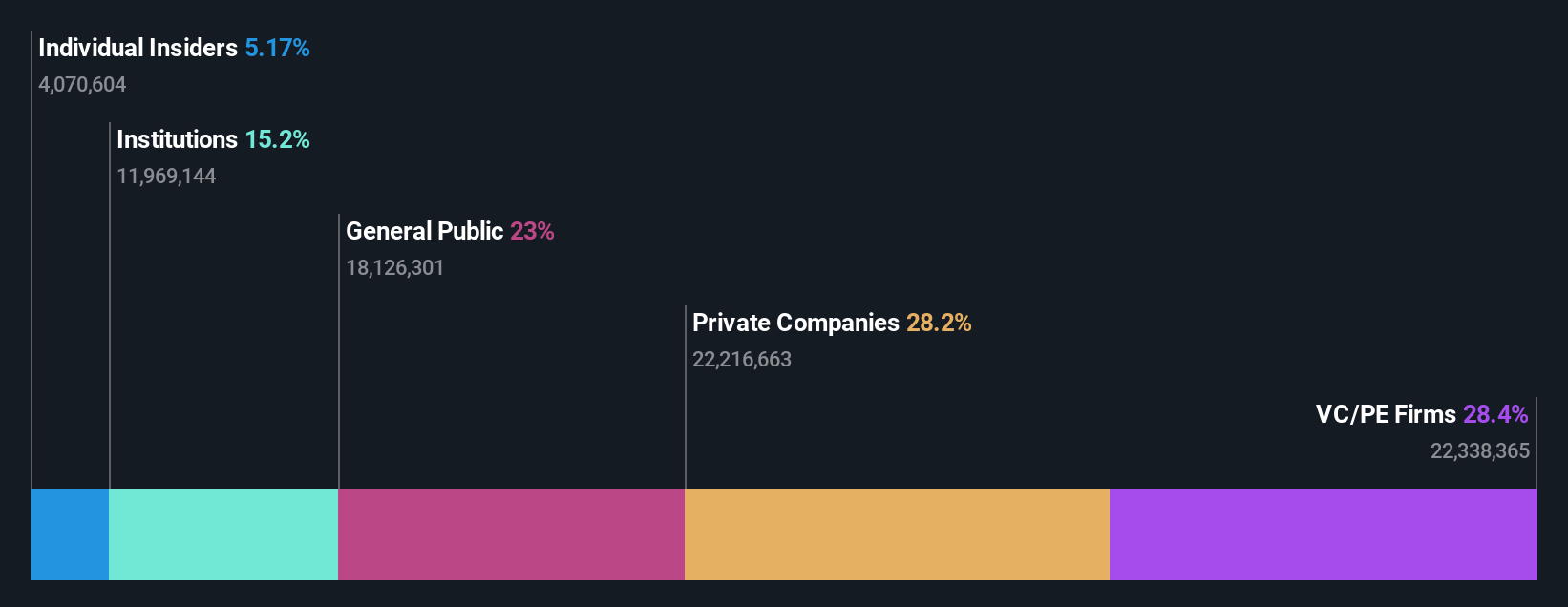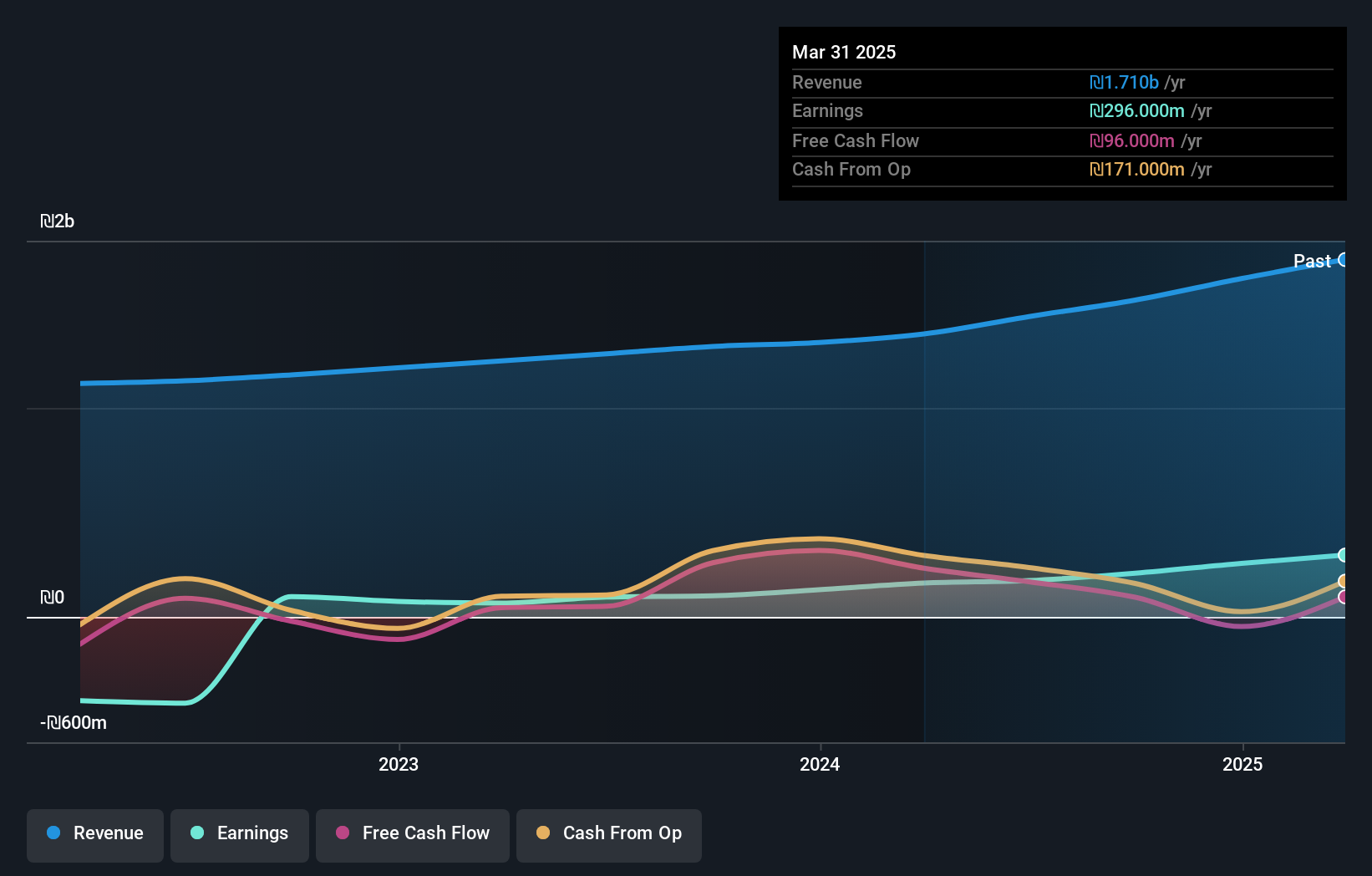- Israel
- /
- Capital Markets
- /
- TASE:MTAV
Meitav Investment House Ltd's (TLV:MTAV) largest shareholders are private equity firms who were rewarded as market cap surged ₪579m last week

Key Insights
- Significant control over Meitav Investment House by private equity firms implies that the general public has more power to influence management and governance-related decisions
- The top 2 shareholders own 56% of the company
- Institutional ownership in Meitav Investment House is 15%
To get a sense of who is truly in control of Meitav Investment House Ltd (TLV:MTAV), it is important to understand the ownership structure of the business. And the group that holds the biggest piece of the pie are private equity firms with 28% ownership. Put another way, the group faces the maximum upside potential (or downside risk).
As a result, private equity firms were the biggest beneficiaries of last week’s 12% gain.
In the chart below, we zoom in on the different ownership groups of Meitav Investment House.
View our latest analysis for Meitav Investment House

What Does The Institutional Ownership Tell Us About Meitav Investment House?
Institutions typically measure themselves against a benchmark when reporting to their own investors, so they often become more enthusiastic about a stock once it's included in a major index. We would expect most companies to have some institutions on the register, especially if they are growing.
As you can see, institutional investors have a fair amount of stake in Meitav Investment House. This suggests some credibility amongst professional investors. But we can't rely on that fact alone since institutions make bad investments sometimes, just like everyone does. It is not uncommon to see a big share price drop if two large institutional investors try to sell out of a stock at the same time. So it is worth checking the past earnings trajectory of Meitav Investment House, (below). Of course, keep in mind that there are other factors to consider, too.

We note that hedge funds don't have a meaningful investment in Meitav Investment House. BRM Group is currently the largest shareholder, with 28% of shares outstanding. For context, the second largest shareholder holds about 28% of the shares outstanding, followed by an ownership of 5.7% by the third-largest shareholder. Additionally, the company's CEO Ilan Raviv directly holds 1.5% of the total shares outstanding.
A more detailed study of the shareholder registry showed us that 2 of the top shareholders have a considerable amount of ownership in the company, via their 56% stake.
Researching institutional ownership is a good way to gauge and filter a stock's expected performance. The same can be achieved by studying analyst sentiments. As far as we can tell there isn't analyst coverage of the company, so it is probably flying under the radar.
Insider Ownership Of Meitav Investment House
The definition of company insiders can be subjective and does vary between jurisdictions. Our data reflects individual insiders, capturing board members at the very least. Company management run the business, but the CEO will answer to the board, even if he or she is a member of it.
Most consider insider ownership a positive because it can indicate the board is well aligned with other shareholders. However, on some occasions too much power is concentrated within this group.
We can report that insiders do own shares in Meitav Investment House Ltd. The insiders have a meaningful stake worth ₪284m. Most would see this as a real positive. It is good to see this level of investment by insiders. You can check here to see if those insiders have been buying recently.
General Public Ownership
The general public-- including retail investors -- own 23% stake in the company, and hence can't easily be ignored. While this group can't necessarily call the shots, it can certainly have a real influence on how the company is run.
Private Equity Ownership
Private equity firms hold a 28% stake in Meitav Investment House. This suggests they can be influential in key policy decisions. Sometimes we see private equity stick around for the long term, but generally speaking they have a shorter investment horizon and -- as the name suggests -- don't invest in public companies much. After some time they may look to sell and redeploy capital elsewhere.
Private Company Ownership
We can see that Private Companies own 28%, of the shares on issue. Private companies may be related parties. Sometimes insiders have an interest in a public company through a holding in a private company, rather than in their own capacity as an individual. While it's hard to draw any broad stroke conclusions, it is worth noting as an area for further research.
Next Steps:
It's always worth thinking about the different groups who own shares in a company. But to understand Meitav Investment House better, we need to consider many other factors. Like risks, for instance. Every company has them, and we've spotted 2 warning signs for Meitav Investment House (of which 1 can't be ignored!) you should know about.
Of course, you might find a fantastic investment by looking elsewhere. So take a peek at this free list of interesting companies.
NB: Figures in this article are calculated using data from the last twelve months, which refer to the 12-month period ending on the last date of the month the financial statement is dated. This may not be consistent with full year annual report figures.
New: Manage All Your Stock Portfolios in One Place
We've created the ultimate portfolio companion for stock investors, and it's free.
• Connect an unlimited number of Portfolios and see your total in one currency
• Be alerted to new Warning Signs or Risks via email or mobile
• Track the Fair Value of your stocks
Have feedback on this article? Concerned about the content? Get in touch with us directly. Alternatively, email editorial-team (at) simplywallst.com.
This article by Simply Wall St is general in nature. We provide commentary based on historical data and analyst forecasts only using an unbiased methodology and our articles are not intended to be financial advice. It does not constitute a recommendation to buy or sell any stock, and does not take account of your objectives, or your financial situation. We aim to bring you long-term focused analysis driven by fundamental data. Note that our analysis may not factor in the latest price-sensitive company announcements or qualitative material. Simply Wall St has no position in any stocks mentioned.
About TASE:MTAV
Solid track record second-rate dividend payer.
Similar Companies
Market Insights
Community Narratives



